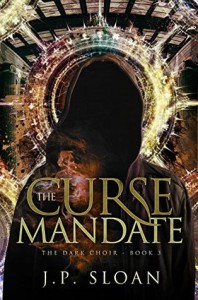

The Curse Mandate
by J.P. Sloane
Alright, this proves it: Dorian Lake is a trouble magnet. All the man wants to do is train his new apprentice and find his dislocated soul, and maybe make a living from his job as a hex-maker and his new gig as a bar owner. But fate--or knowing Dorian, it's probably karma-- just refuses to cooperate. Instead, he finds himself promising to help out his apprentice's brother with a nasty curse and finds himself embroiled in a nasty string of mysterious jinxes that threatens to bring the Presidium-- the governing body of American magicians-- right down on his head. As he puts it:
"The Presidium's about to go on a tear. Last time that happened, we got the Red Scare. Before that, Manifest Destiny."
Oh, and the demon he sold his soul to before it went walkabout is asking for a new deal while there's still time to make one.
If you're addicted to urban fantasy and looking for a Dresden Files analogue, then in some ways, this could be a good fit. There's a less-than-thriving magic business, a basement where magical experiments are conducted, a young and attractive apprentice that the narrator has an exasperating tendency to salivate over, and even the extreme overuse of a few catchphrases. (Ever since I read the Dresden Files, I've winced every time I've read "arched an eyebrow" or "shambled." In the Dark Choir series, on the other hand, there are far too many "sniffles," "grumbles," and "smirks," usually when words with a neutral connotation are more appropriate.) On the more entertaining side, both have a protagonist who eschews technology because of magic's ability to "put a whammy on electronic devices", and even a detective from "Special Investigations," a unit I'm pretty sure exists only in Canada and the world of Harry Dresden. I found Wren, this series' answer to Charity Carpenter, a lot more likeable. There are also many distinctive worldbuilding, from the far more secretive Presidium to the practice of geomancy to the weird world of the stregha. This book, in particular, greatly fleshes out the shadowy Presidium, dipping into an enjoyable early American alternate history.
However, despite all of the similarities, I found the tone radically different, both darker and more (intentionally) morally ambiguous than anything the Dresden Files can serve up. To start with, the magic of Dorian's world is a hell -- if you'll pardon the pun-- of a lot nastier. The powerful stuff ranges from chaos magic to Netherwork -- curses powered by the demonic "Dark Choir" -- to scary forces channeling the nastier aspects of nature. Dorian's magic is primarily hexwork based on what he blithely describes as "karma." Don't get me wrong; it still has its fun and silly moments--my favourite involved the magical properties of smiley faces-- but all of that moral ambiguity add a hell of a lot more suspense to the brew because the reader is left genuinely concerned about whether Dorian will slide off the moral event horizon. I found the plot itself somewhat problematic because of its tendency to completely drop subplots at arbitrary moments, but this additional moral suspense kept me simultaneously engaged and frustrated.
(show spoiler)Both Dorian and his allies take actions that made me cringe, and I still don't know where the series is heading, or just how much of an antihero Dorian will become. It's something of a refreshing change from cookie-cutter UF. When combined with a mystery I found utterly perplexing, all of this made the book nearly impossible to put down.
As for Dorian himself, he's still pretty much the guy you love to hate, but what I really appreciate about this series is that it is so very self-aware of the protagonist's flaws. The other characters continually confront Dorian with his general entitled, self-obsessed, obnoxiousness. They call him out in the way he talks down to everyone, the way he believes he deserves to win, the way he demands loyalty of others long before he grants it to them, the way he stumbles into situations he doesn't take the time to understand. One asks:
"Why do you make everything about you when it isn't? And when it actually is about you, you make it about everyone else."
So sure, Dorian is annoying and seriously flawed, the novels don't try to convince us otherwise, which makes all the difference. Plus, there are the side characters. As in previous books, I have significant issues with the way women are characterized: they're all pretty much seductresses, naifs, or in the rare cases they do manage to gain power, they're depicted as animalistic. But hey, that's a criticism that is pretty much innate to the genre. Series staples Edgar and Wren make an appearance, as does Ches, the rather conflicted character of the last book, and Julian Bright, ex-politician-assistant and current bar owner. One character I was quite happy to see again was Reed Malosi, the guy Dorian kept calling "Penn State", and he has a much more central role here, and I love his character even more.
In the increasingly overcrowded world of urban fantasy, J.P. Sloane adds some new elements. Despite much of the standard machinery, from a struggling business to a sexy apprentice, Dorian himself is unique, both in his own unabashed flaws and the risk that he'll genuinely go Dark Side. Although I don't say this often, I suspect the Dark Choir series would be quite difficult to read out of order, so if this book sounds intriguing, I'd suggest checking out The Curse Merchant first. If you're looking for a new UF series, the Dark Choir series is worth a look. I don't know where this series is heading, but I'm definitely in for the next book.
~~I received an advanced reader copy of this ebook from the publisher, Curiosity Quills Press, in exchange for my honest review. Thanks!~~

 2
2




